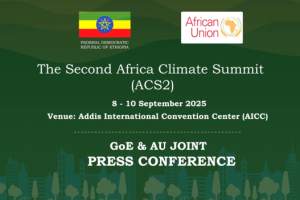BY HAFTU GEBREZGABIHR
Wealthy nations continue to finance natural gas for developing countries, putting climate goals at risk, while environmentalists and advocates in the field are calling for a timely shift from fossil energy to development of sustainable energy.
To discourage the use of fossils, funders are also cutting their resources that could be deployed to exploit fossils and are calling for an end to natural gas development, however some poor nations say doing so would unfairly penalize them and stifle economic growth.
As the world’s governments try to raise their collective climate ambitions, one of the biggest questions is whether developing countries can expand their access to energy and reduce poverty without driving a sharp rise in greenhouse gas emissions.
For instance, Africa has considerable reserves of fossil fuels of all kinds: oil, coal and natural gas. Much of this resource is either utilized outside of Africa or some of the resource is not developed at all for use within the continent. Meanwhile, there are concerns that the future of fossil fuel use will need to take place in the context of a low carbon development pathway. It is therefore important to explore the resource and technical challenges and opportunities associated with the expanded utilization of fossil fuels in Africa.
A new report warns that wealthy nations are still pushing in the wrong direction, by continuing to finance new natural gas infrastructure across the global south. While natural gas once held the promise of serving as a “bridge fuel” to a cleaner future, a growing body of scientific research suggests the fossil fuel will need to be phased out rapidly in coming decades in order to meet the goals of the Paris Agreement.
Many scientists and advocates have been arguing that in order to limit warming to 1.5 degrees Celsius (2.7 degrees Fahrenheit) by the end of the century, investment in all fossil fuels must come to an immediate end. Last month, the International Energy Agency, which advises governments, said that meeting that goal would require that no new oil and gas fields be developed after this year, though it said some continued investment in existing fields would be required. In the power sector, the agency said, the use of natural gas would need to start declining by 2030 and then fall sharply, unless plants are fitted with technology to capture emissions, a proposition that remains prohibitively expensive.
These calls to end financing, however, have faced criticism from some developing nations over concerns that a hard ban on fossil fuel financing could be unjust, especially in sub-Saharan Africa, which has generated only a tiny fraction of the worlds greenhouse gas emissions and where hundreds of millions of people have no access to electricity.
“If you’re looking to reduce emissions, you’re looking in the wrong place,” said W. Gyude Moore, a senior policy fellow at the Center for Global Development, a think tank that receives money from governments, nonprofit foundations and industry. Moore, who served previously as Liberias Minister of Public Works, has argued that any ban on financing should have a carve-out that allows continued lending for natural gas projects in sub-Saharan Africa. “This is the poorest part of the world,” he said. “This is the part of the world that is least responsible and the place with the highest demand for energy.”
Across the developing world, nearly 800 million people lack access to electricity, while billions still rely on polluting, unhealthy fuels like biomass for cooking. The energy industry has argued that natural gas provides a solution. Expanded gas use in Asia, Africa and Latin America also presents perhaps the only opportunity for oil and gas companies to expand their markets.
There are geopolitical pressures to increase gas use, too. As domestic markets tighten, major producing countries, including the United States, Russia and Australia, have been preparing to export more of their gas in the form of Liquified Natural Gas, an energy-intensive fuel that produces more greenhouse gas emissions than conventional gas.
But some advocates and policy experts argue that the least developed countries in particular have an opportunity to “leapfrog” fossil fuels entirely. Wind and solar power are increasingly competitive with or even cheaper than natural gas for power generation, and technologies for electrifying other sectors and for storing power in batteries are developing rapidly. One of the biggest hurdles to deploying renewable energy in developing countries is access to financing.
This challenge has turned increased attention to development banks and other public lenders. While they provide a relatively small proportion of global financing, their loans can help unlock much more money from the private sector, by reducing the risk of lending and delivering signals to the broader market.
As these lenders work out the details of their new restrictions, some in the developing world have called for nuanced policies that take into account countries relative wealth and access to energy. Moore said natural gas can play a role in a diverse energy mix in Africa, to compensate for the intermittent nature of wind and solar power. Any additional emissions, he said, would be small compared to the rest of the worlds share, and should be made up for by steeper cuts in wealthy countries.
Harry Verhoeven, senior research scholar at the Center on Global Energy Policy at Columbia University, said eliminating public finance for fossil fuel projects could effectively end those sectors development in Africa, because private companies would be unlikely to lend money on their own. Fossil fuel finance bans could also undermine whatever influence Western countries and institutions have in Africa, he said, and lead countries in the region to simply turn to China for financing instead.
Verhoeven said international aid and financing has stagnated in recent years, and that theres widespread belief in African countries that additional financing for renewables wont materialize. “Therefore this very much looks like economic punishment of them without much in return,” he said.
But the report argues theres financial risk for developing nations that build out new gas infrastructure. If countries in Africa fund pipelines and power plants today, Muttitt said, they may end up saddled with obsolete infrastructure within a couple of decades, leading to high levels of debt or high energy costs.
“The idea of building long-lived infrastructure in poor countries where investment resources are very limited and where that infrastructure may become obsolete in 10 or 20 years seems to me not a good use of capital,” he said.
The largest destination for natural gas financing in recent years was Mozambique, the report said, where multinational oil giants have been building LNG facilities to export the fuel from a major new gas discovery. The development has coincided with the rise of a militant insurgency there—Total, the French oil company, recently suspended its operations in response—and the report said the development has only deepened the countrys foreign debt. A growing number of think tanks and advocates have been arguing that countries like Mozambique, which are counting on revenues from fossil fuels to pay down debt and help improve living conditions, could face sharp declines in revenue if global demand begins to decline rapidly in coming years.
In its recent report on reaching net-zero by 2050, for example, the International Energy Agency said that many of the LNG terminals currently under construction or being planned would not be needed if climate goals are met.
The Ethiopian Herald July 10/2021




